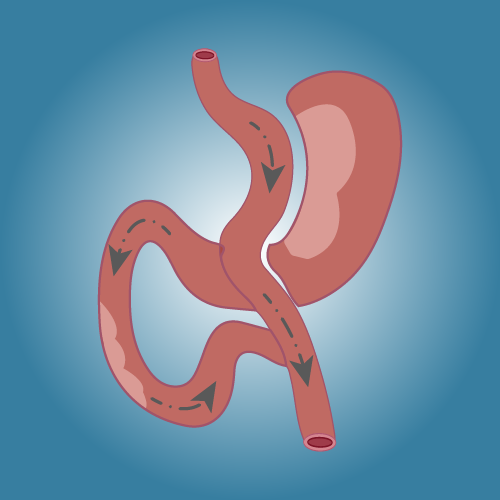
Mini Bypass in Turkey
Contact us for a Mini Bypass in Turkey/Antalya
from £3,490

Mini Gastric Bypass Turkey / Antalya - Costs & Procedure
- Hospitalisation4 days
- Treatment duration1-3 hours
- Regeneration2 days
- Costsfrom £3,490
High quality at a fair price
The leading agency for medical tourism in Turkey
Save up to 60 %
Save up to 60 % on your treatment in Turkey
No hidden costs
Transparent package prices for your operation in Turkey.
Table of Contents

Mini Bypass in Turkey
Mini bypass in Turkey is an anti-obesity and anti-diabetes surgery (a so called metabolic surgery) that slightly reduces absorption in the first part of the new created small intestine in addition to reducing the volume of the stomach. The stomach is transformed into a long tube and its volume is reduced to about 150 cubic centimeters. The stomach is connected to the formed gastric tube bypassing the first part of the small intestine. No foreign objects are introduced into the stomach. This procedure is so called because the operation takes less time. Mini gastric bypass in Turkey is performed laparoscopically. It is a simple and safe procedure that can be easily modified, altered or reversed and is becoming more and more popular worldwide. Mini gastric bypass is one of the most popular surgical procedures worldwide because it has a significant impact on weight loss, provides additional disease control, and improves well-being. The key to success, as with all other methods, is the development of appropriate dietary strategies and lifestyle changes after surgery. When these recommendations are followed, this is a surgery that can maximize physical and mental health while minimizing the impact on the patient’s life.
The risk of a Omega gastric bypass is 3 times less than the risk of a closed gallbladder surgery and 2 times less than the risk of an appendectomy. As with all procedures that impact our lives, the balance between benefits and harms must be considered in decision making, and it should be noted that obesity alone can shorten a person’s life by about 12 years.
Mini gastric bypass in Turkey is performed laparoscopically. It is a simple and safe procedure that can be easily modified, altered or reversed and is becoming more and more popular worldwide. Mini gastric bypass is one of the most popular surgical procedures worldwide because it has a significant impact on weight loss, provides additional disease control, and improves well-being. The key to success, as with all other methods, is the development of appropriate dietary strategies and lifestyle changes after surgery. When these recommendations are followed, this is a surgery that can maximize physical and mental health while minimizing the impact on the patient’s life.
The risk of a Omega gastric bypass is 3 times less than the risk of a closed gallbladder surgery and 2 times less than the risk of an appendectomy. As with all procedures that impact our lives, the balance between benefits and harms must be considered in decision making, and it should be noted that obesity alone can shorten a person’s life by about 12 years.


Mini Bypass in Turkey Procedure
As in gastric bypass, the stomach is divided into two parts. The difference with gastric bypass is that the intestines are connected to the stomach without being divided. This reduces the overall connection in mini gastric bypass. The reduction in absorption is due to the fact that a larger part of the intestine is bypassed in gastric bypass compared to gastric bypass surgery.
After surgery, the absorption capacity of your body’s digestive system is reduced – to a level that will not adversely affect life anymore. After surgery, a vitamin supplement should be taken once a day. One of the main causes why mini a gastric bypass is becoming more and more common and has a very good success/comfort profile is that it has a significant impact on diseases such as type 2 diabetes, hypertension, high cholesterol and sleep apnea compared to many other surgical procedures.

Online BMI calculator
Here you can find out your current BMI.

Gastric Bypass in Turkey Cost
Mini bypass in Turkey cost from £3,190 you can take advantage of mini bypass surgery with us in Turkey. Check also the cost of medical treatment in Antalya. Thousands of patients from Europe visit Turkey for medical treatment. Before traveling to Turkey for medical treatment, patients want to know what the total cost of the treatment is so they can better plan their finances. These are significantly lower than European prices thanks to lower personnel costs. Nevertheless, we do not skimp on service, picking you up from the airport, providing you with an interpreter, as well as a nutritionist.

Behavior after the mini bypass in Turkey
Gastric bypass in Turkey is known as one of the most effective and durable bariatric surgeries. Weight loss begins immediately after surgery, and 70-90% of excess weight can be lost in about one year.
Mini-bypass is performed laparoscopically (through small incisions, without opening the abdomen) under general anesthesia in Turkey. Using intestinal staplers, the surgeon inserts three rows of (biocompatible) titanium staples on each side and cuts open the stomach to form a smaller section of stomach connected to the small intestine. The goal is to create a bridge between this and the stomach. The patient stays in the hospital for three to four nights and usually resumes daily activities within a week. The surgery is restrictive, meaning that the amount of food the patient can eat is limited by creating a stomach reservoir of about 80-100 ml. This means that the patient eats little and is quickly full.
And the malabsorption component is achieved by connecting the stomach pouch to the small intestine, about 150-200 cm from the beginning of the small intestine. The food does not pass the duodenum and the first parts of the intestine because there is no bile or pancreatic juice. The food is not absorbed, which contributes to weight loss and long-term weight maintenance.

